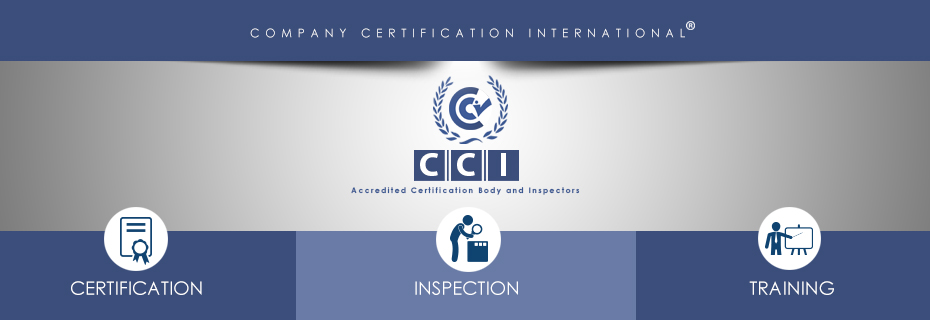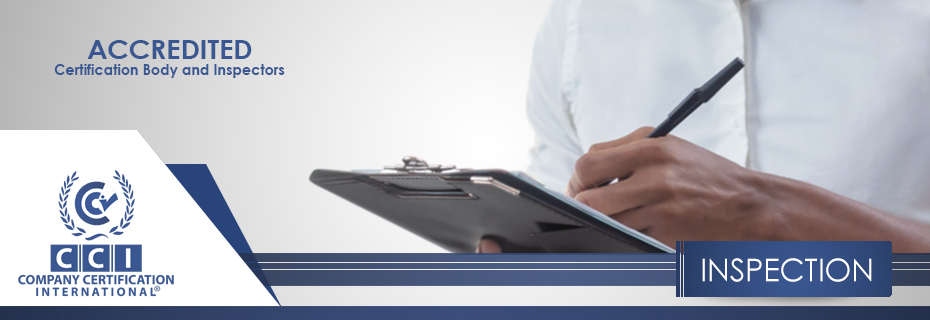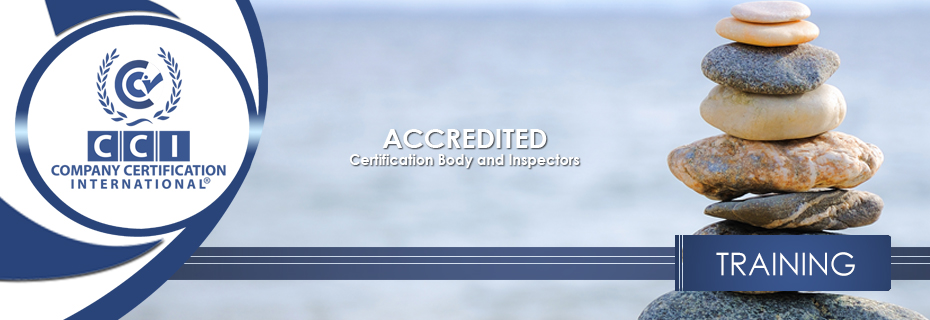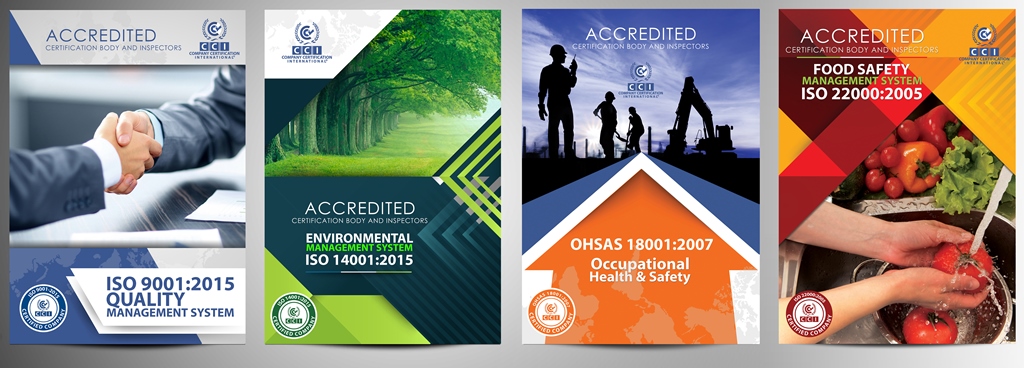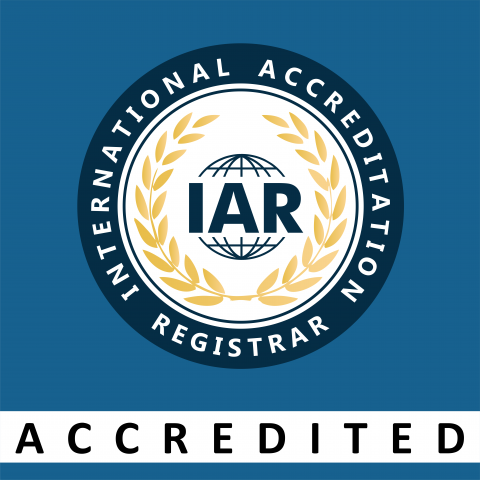Certification Rules
Definition
CCI: Company Certification International
Applicant: Organisation applying for management system certification by Company Certification International.
Client: the Organisation has contracted Company Certification International for management system certification Systems.
Logo: This means the logo is approved by the CCI Services.
Appeals Committee: This means a committee of the CCI Services Certification Board established for the purpose of hearing appeals. The panel appointed in respect of each appeal will consist of a Chairman and at least two members of the Certification Board, none of whom shall have any direct interest in the subject of the appeal.
Board: This means the Board established as the governing body of the CCI Services.
Standard, or Scheme: Means the standard or scheme for which the Client is seeking Certification (e.g.: ISO 9001, ISO 14001 & ISO 27001) and, or Inspection services, or related services provided by the CCI Services.
Certificate: Means a certificate recognizing that the management system or Inspection performed, or Training given, or another service which produces a Certificate output, granted to the organization having been assessed by CCI Services member in accordance with these regulations.
Schemes Manager: This means the person who is appointed for the time being by the Board of Directors with approval by the board, to be in charge of the area for which the Board has responsibility. There may be several Schemes Manager(s) dependent on the Schemes and, or services offered.
Registered Organization: This means an individual, body corporate or body incorporate which has been granted a certificate by a CCI Services member.
Documented Management System: Means a set of documents/descriptions/protocols/Std. Operating Procedures/Work Instructions, or other formal instructions serving to implement the system of an organization which sets out the specific practices, resources, and activities of that organization relevant to achieving compliance with a particular standard, specification, or otherwise specified requirement, plus, if appropriate, practices and activities relevant to specific Codes of Practice.
Guidance Notes/Auditor Notes: This means a document developed by the CCI Services, industry, procurement, and associated interests, with or without the participation of CCI Services member which particularizes the requirements of a Standard/Scheme/Requirement in relation to a particular sector of industry.
Initial Enquiry Form: Document used to gather and record client specific information necessary to make an informed decision regarding the requisite competence required to conduct an effective audit.
1. Certification Scheme
In order to obtain and retain certification all applicants and clients to the scheme must adhere to the following rules of the scheme.
All information deemed necessary by CCI in order to complete the assessment should be made available by the applicant through the applicable initial enquiry form.
CCI will run the scheme in transparent and fair manner without prejudice and discrimination of any applicant due to its size, type of business, financial or political background.
CCI shall be responsible for complete process and all activities of certification, from the initial document review, audit/evaluation of the client's Management System through periodic surveillance audits and reassessment audits/evaluations.
CCI shall inform the client of the initial audit/evaluation results and if not satisfied that all the requirements for the certification are being met, shall inform the client of those aspects in which the application is deemed noncompliant.
When the client can demonstrate that effective remedial action has been taken to meet all the requirements within a specified time limit, CCI will review the remedial action and determine the suitability of awarding certification.
All certificated clients are entitled to provide feedback and suggestions relating to the potential areas for improvement of the rules & regulations.
CCI reserves the right to make minor changes and corrections to these Rules & Regulations without prior notification. Clients will be given prior notice of any changes that affect their responsibilities or liabilities.
The client shall ensure that the question of responsibility to CCI for the certified system is clearly defined, e.g. by appointing a designated person who is nominated to maintain contact with CCI to ensure that the above provisions have been observed.
The client shall permit scheme accreditation representatives or trainee CCI auditors all reasonable access for the purpose of observing CCI’s auditors/evaluators performing initial audit/ evaluation and/or surveillance activities.
2. Initial Audit/Evaluation for Certification
Initial audits/evaluations shall be conducted against the applicant's procedures and the requirements of internationally accepted:
- product certification schemes,
- management system standards
- Applicable legislations and Directives
- And/or sector schemes’ series of documents.
3. Certification
When an initial audit/evaluation has been completed and systems deemed to be satisfactory to the standard requirements by the approved scheme management, the relevant Scheme/Certification Manager shall inform the applicant accordingly and issue a certificate of registration.
Surveillance frequency will be stipulated as either once or twice each year, but additional visits may be conducted at the discretion of the Scheme Managers of CCI.
The certificate applicable to a specific business scope covering product, process, service, site or organization may be suspended for a limited period (in most cases the suspension would not exceed 6 months) in, but not limited to the following cases: -
- If the regular surveillance or recertification audit shows non-compliance with the requirements which is of such a nature that does not require immediate withdrawal.
- If a case of improper use of the certificate, e.g. misleading prints or advertising is not solved by suitable retractions or other appropriate remedial measures by the client.
- The client has voluntarily requested a suspension
- If there has been any other contravention of the certification rules and regulations.
- If corrective action requests (CAR’s) have not been implemented within specified time scales.
- if the surveillance or re-audit is delayed by more than 2 months beyond the due date
The client shall not identify as a CCI certificated organization covering the product, process or service that has been offered in the course of suspension.
The Scheme/Certification Manager of CCI will confirm an official suspension of the certificate to the client. At the same time the Scheme/Certification Manager shall indicate under which conditions the suspension will be removed.
At the end of the suspension period, an investigation will be carried out to determine whether the indicated conditions for reinstating the certificate have been fulfilled.
On fulfilment of these conditions the suspension could be lifted by notifying the client that the certification has been reinstated.
If the conditions are not fulfilled, the certificate shall be withdrawn.
All costs incurred by CCI, in the suspending and reinstating of certificates will be charged to the client.
4. Extending Certification
A client wishing to extend the scope of its certification to cover additional products, processes, services or sites shall apply to CCI in writing. A Scheme/Certification Manager shall review the nature of extension and decide on the necessary audits/evaluations to be performed.
5. Publicity by Certificate Holders
A client has the right to publish that the product, process or service and company have been certified CCI and apply certification mark to promotional materials for which the certificate applies.
In every case, the client shall take sufficient care of its publications and advertising so that no confusion arises between management system certification and specific product certification, certificated and non-certificated business scopes covering product and/or services, which may mislead the market.
The client shall not make any claim that could mislead purchasers to believe that a product, process, service, site or organisation is covered by the certification when in fact it is not.
6. Publicity by CCI
Non-confidential information relating to a client certificated management system may be placed in the public domain by CCI.
7. Confidentiality
CCI shall endeavour to ensure that its employees and contractors maintain secrecy concerning all confidential information with which they become acquainted as a result of their contacts with the client.
The client shall maintain confidentiality of all commercial terms and conditions with CCI for certification services.
Information about a particular client of individual shall not be disclosed to any third party without the written consent of the client or individual concerned.
Where CCI is required by law to release confidential information to a third party, the client or individual concerned shall, unless regulated by law, be notified in advance of the information provided.
When confidential information is made available to other bodies, (e.g. accreditation body, agreement group or a peer assessment scheme,) confidentiality of information viewed will be assured during access by these bodies.
8. Misuse of a Certificate
CCI shall take all reasonable precautions to control the use of its certificates by the certificated clients.
Incorrect references to certifications or misleading use of certificates found in advertisements; catalogues, etc. shall be dealt with by suitable actions, which could include legal or corrective action or publicizing the transgression.
Clients are invited to report to the Scheme/Certification Manager any misuse of the CCI’s marks which comes to their attention. The source of all information received will be treated in confidence.
The certificate of registration is valid for three years from date of issue or recertification, subject to the client continuing to meet the certification requirements detailed within the rules & regulations.
It may be necessary for CCI to conduct audits of certificated clients at short notice to investigate complaints, or in response to changes, or as a follow-up on suspended clients. Under such circumstance CCI shall exercise additional care in the assignment of the audit team. The certificate will remain the property of CCI and shall always be returned on request.
All clients shall maintain a log of all customer complaints they receive which fall within the scope of registration for which a certificate has been awarded.
The details responding actions against these customer complaints shall be available for CCI review in the audit.
In some cases CCI can outsource it’s client’s management system certification audit through a legally enforce agreement, but CCI is the only authority for its client management systems certification decision and don’t outsource the decisions of granting, maintaining, renewing, extending, reducing, suspending or withdrawing of certification.
9. Suspension of Certification
Complaints received by CCI from any stakeholder regarding the activities of a certificated client shall be referred to that client at an appropriate time. The complaint shall be investigated in accordance with the CCI complaints handling process procedure.
The alleged complaint is logged and evaluated to establish its validity, with any requisite corrective and preventive action instigated where necessary. This process shall be subject to requirements of confidentiality. CCI shall determine, together with the client and complainant, whether and, if so to what extent, the subject of the complaint and its resolution shall be made public.
10. Withdrawal / Cancellation of Certificate
Failure to resolve the issues that have resulted in the suspension of certification in a time specified by CCI shall result in withdrawal or reduction of the scope of certification. A certificate may be withdrawn or the scope of certification reduced in the following cases: -
- If the audit shows that the non-compliance is of a serious nature.
- if the surveillance or re-audit is delayed by more than 4 months beyond the due date
- If the client fails to settle the due payment of its financial obligation.
- If the client fails to take adequate measures in case of suspension.
- If any actions are taken by the client which would bring the CCI’s scheme into disrepute
In the above cases CCI has the right to withdraw the certificate by informing the client. The client shall have the right to appeal.
Certificates will be cancelled in the following cases: -
- If the client does not wish to continue certification to the scheme.
- if the product, process or service is no longer offered
- If the client ceases trading for whatever reason.
11. Corrective Actions
When CCI receives a report of certificate misuse the report shall be investigated. If misuse is substantiated, the cost of the investigation shall be paid by the certificate holder.
CCI will determine the scope of misuse and the type of corrective action to be undertaken.
12. Complaints Handling Process
Should the client have cause to complain regarding the conduct of CCI’s staff, the complaint should be made in writing and addressed to the relevant Scheme/Certification Manager or the complaint should be made online at https://companycertification.com/complaint
Should the complaint be made against the Scheme Manager, the letter of complaint should be addressed to CCI responsible board director.
13. Appeals Procedure
The client has the right to appeal against any notification given regarding the suspension, reduction in scope or withdrawal of certification by CCI Services. Notification of a client's intention to appeal must be made online at https://companycertification.com/complaint within 30 days of receipt of notification of failure to comply with the certification requirements.
CCI Services shall make the suspended status of the certification publicly accessible. The client has the right to object to the involvement of particular members of the CCI Service’s management in the appeals procedure if evidence can be provided that their impartiality is compromised.
The appellants also have the right to present their case in person at their own expense. The decision of the Supervisory Board shall be final and binding on both the client and CCI shall make the suspended status of the certification publicly accessible.
The client has the right to object to involvement of particular members of the CCI’s management in the appeals procedure if evidence can be provided that their impartiality is compromised. The appellants also have the right to present their case in person at their own expense.
The decision of the Supervisory Board shall be final and binding on both the client and CCI. Once the Supervisory Board has made a decision regarding an appeal, no counter claim by either party in dispute can be made to amend or change this decision. Decisions on appeals will be made within 4 months of receipt of the appeal.
In instances where the appeal has been successful and the award made or reinstated, reimbursement of costs of appeals will only be made at the discretion of the top management.
Submission investigation and decisions on appeals shall not result in any discriminatory actions against the appellant
14. Fees
CCI shall be entitled to charge fees at a level to be determined from time to time having regard to its operating costs relating to the services, administration and long term development of the services.
Commercial arrangements are detailed in service contracts or other agreements between CCI and the clients.
15. Notice of Changes
All clients are required to inform CCI without delay of matters that may affect the capability of the management system to continue to fulfil the requirements of the standard used for certification. The matters include changes relating to:
- The legal, commercial, organisational or ownership, including key managerial, decision-making or technical staff. - Contact address and sites
- Size and Scope of business under the certified management system
- Major changes to the management system and processes
CCI’s auditors must also be notified of all changes made to the management system since the previous visit.
CCI shall give its certificated clients due notice of any changes to its requirements for certification.
16. Disputes
Any disputes subject to legal proceedings will be settled in accordance with Local Law.
The Certification Process
Online gap analysis allows us to see the current
- quality benchmark within your organization,
- the finances required
- the time required for this project (System and Certification Fee)
Your Estimate will be shared with you in 24 hours.
Upon Estimate Approval the project starts:
- A client executive is assigned to your project
- Contact information is shared with you
- The Payment details are provided to you
All Support is delivered Online.
The Client Executive will provide the Documentation Templates and explain to you how to amend it.
You will be required to perform the following tasks:
- Identify your core or business processes.
- Amend documentation that meets your business needs. (Policy statements, objectives, manuals, work instructions, job descriptions, forms.)
- Encourage employees to be aware of the new documented system
- Review, approve, and distribute the documents to those who need access to the information.
- Ensure procedures are being performed as documented.
- Ensure employees are trained properly for the tasks they are performing.
- Create effective reporting systems.
- Monitor the effectiveness of your processes through the use of measurable data, where possible.
- Review and take action to improve in the areas required.
- Plan internal auditing activities.
- Submit your management system documentation for review to ensure it complies with the applicable standard.
- Prepare for review by an external auditor to confirm that the system’s requirements are being satisfied and that the management system is implemented effectively.
- Obtain ISO Certifcaiton
- This periodic on-site review is usually conducted annually.
- It ensures that the certified business continues to comply with Standard requirements, as confirmed during the Recertification Audit at the certification cycle's outset.
- Most are conducted remotely.
Refer to learn more about Types of Audits

